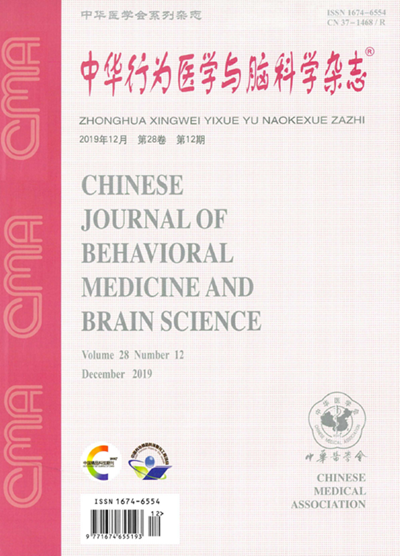老年人恢复力与认知障碍的关系
引用次数: 0
摘要
目的探讨老年人心理弹性与认知功能障碍的关系。方法采用整群抽样方法,对安徽省6 524名60岁及以上老年人进行面对面问卷调查。调查内容包括一般人口特征、复原力和认知功能。采用t检验、卡方检验、二元Logistic回归等统计方法进行数据分析。结果老年人认知功能障碍发生率为13.6%(886/6 524)。认知功能正常老年人的心理弹性得分为(64.89±11.96)分,认知功能受损老年人的心理弹性得分为(56.10±11.12)分,差异有统计学意义(t=20.511, P<0.001)。Logistic回归分析显示,老年人心理弹性与认知功能障碍之间存在统计学相关性(OR=0.936, 95%CI: 0.930~0.943)。在调整抑郁、性别、年龄等相关因素后,老年人心理弹性与认知功能障碍仍存在统计学相关性(OR=0.963, 95%CI: 0.955~0.971)。结论弹性与老年人认知功能障碍有关,较高的弹性是老年人认知功能障碍的保护因素。关键词:弹性;认知障碍;老年人;抑郁症本文章由计算机程序翻译,如有差异,请以英文原文为准。
Association between resilience and cognitive impairment in the elderly
Objective
To explore the association between resilience and cognitive impairment in the elderly.
Methods
A face-to-face questionnaire survey was conducted among 6 524 elderly people aged 60 and over in Anhui Province by cluster sampling. The survey included general demographic characteristics, resilience and cognitive function. Statistical methods such as t-test, chi-square test, binary Logistic regression were used for data analysis.
Results
The incidence of cognitive impairment in the elderly was 13.6%(886/6 524). The score of resilience in the elderly with normal cognitive function was (64.89±11.96), while it was (56.10±11.12) in the elderly with impaired cognitive function and the difference was statistically significant (t=20.511, P<0.001). Logistic regression analysis showed that there was a statistical correlation between resilience and cognitive impairment in the elderly (OR=0.936, 95%CI: 0.930~0.943). After adjusting for depression, gender, age and other related factors, there was still a statistical correlation between resilience and cognitive impairment in the elderly (OR=0.963, 95%CI: 0.955~0.971).
Conclusions
Resilience is related to cognitive impairment in the elderly, and higher resilience is the protective factor for cognitive impairment.
Key words:
Resilience; Cognitive impairment; The elderly; Depression
求助全文
通过发布文献求助,成功后即可免费获取论文全文。
去求助
来源期刊
自引率
0.00%
发文量
8131
期刊介绍:
"Chinese Journal of Behavioral Medicine and Brain Science" (CN 37-1468/R, ISSN 1674-6554) is a national academic journal under the supervision of the National Health Commission, sponsored by the Chinese Medical Association and Jining Medical College. The journal was founded in June 1992 and was formerly known as "Chinese Journal of Behavioral Medicine" (1992-1993) and "Chinese Behavioral Medical Science" (1994-2008). In 2009, it was renamed "Chinese Journal of Behavioral Medicine and Brain Science" with the approval of the State Administration of Press, Publication, Radio, Film and Television.
The purpose of "Chinese Journal of Behavioral Medicine and Brain Science" is to implement the health and health policies of the Party and the State, implement the principle of combining theory with practice and popularization and improvement, and reflect the major progress in the theory and practical application of behavioral medicine and brain science in my country. It publishes academic papers and scientific research results in the field of behavioral medicine and brain science in my country, and has columns such as monographs/reviews, basic research, clinical research, health prevention, methods and techniques, psychological behavior and evaluation, and systematic evaluation.

 求助内容:
求助内容: 应助结果提醒方式:
应助结果提醒方式:


